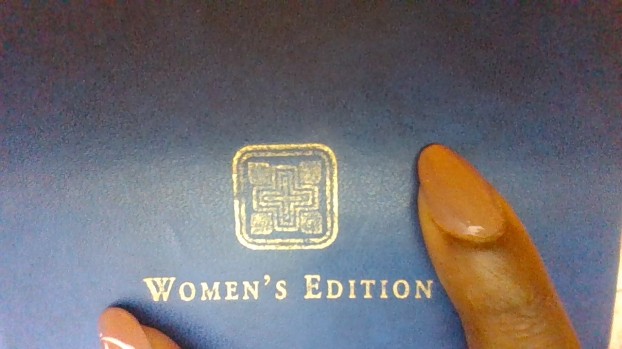And where does that leave single Christian women seeking a man to marry and start a family with, as well as to be a Gospel partner? We’re often told to be content with our single status, or worse still, are pitied. Why is it that the Gospel in every other area of our lives empowers us, ie: ‘…Nor is there male and female, for you are all one in Christ Jesus.’ (Galatians 3:28) and encourages us to pray faithfully about all areas of our lives, ie: ‘…Tell God what you need, and thank Him for all He has done.’ (Philippians 4:6b) but we will more often than not apply a pragmatic mind-set to our work situations more than to our dating lives?
I am all for contentment – as long as the word is not used to suggest we remain passive. I am also all for living life to the full as a single woman – I am in my mid-thirties, single, and did not want to be married at every stage of adulthood. I am however interested in being just as liberated when I am considering a partner for life, as when I am living ‘footloose and fancy-free’ with no plans to find a significant other. So here are my thoughts. Let me know what you think…
1. Be content but stay proactive to prevent discontentment
‘It’s a numbers game’ is what one colleague, an experienced dater recently told me. The more dating websites you join and/or the more people you meet, the more likely you are to find a match. A Christian counsellor whom I respect a lot, Dr Henry Cloud (co-author of Boundaries in Dating) writes in an article, 8 Things Single People Do to Sabotage Their Dating Lives: ‘You’re not actually going out to meet different kinds of people.’ Yep. I heard that mic drop too, and I am still working on this one. How many of us ladies have believed or behaved as though it is the work of a man pursue us, meaning basically he would have to telepathically trace us to wherever we are in the world and hacksaw us out from whatever rock we’ve been hiding under?! Perhaps it’s time to join one, two or maybe three dating websites, cultivate some new hobbies or attend some Christian festivals – whatever needs to be done to ensure our social circles are expanding? I believe contentment is about enjoying the moment and living in gratitude, not shutting down our desires. Even Jesus prayed that the cup of suffering he would undergo on the cross would be taken from him, but the key is that he submitted that desire to the Father.
You can read Dr Cloud’s article here: (https://drcloud.com/article/8-things-single-people-do-to-sabotage-their-dating-lives)
2. Know your true enemy
I get a headache when I hear about the ‘current crisis’ in the church where women outnumber men. I don’t want to engage in pity parties or get bad attitudes towards men, other women, church organisations, outreach programmes or the fact I was born in an era or even in a country that may make finding a husband more challenging, LOL. We are indeed caught up in a battle, but it is a spiritual battle (Ephesians 6:12) which impacts on the very things that promote Love (God is love ~ 1 John 4:8), including romantic love. Identifying the true enemy, relying on God’s power and provision (Psalm 23:1, John 10:10) and understanding my power and purpose in the battle (2 Corinthians 10:3-5) is empowering.
3. Under the New Covenant, marriage is not the be-all and end-all
I cannot emphasise this enough. There are many reasons a woman may feel shame about being unmarried, but it has nothing to do with how God views single people. Jesus was single. OK, so maybe not because he couldn’t find an eligible bachelorette (well actually, who knows?) but he acknowledged there are many reasons someone will not marry (Matthew 19:12) and certainly, at least one of those reasons applied to his situation just as they may apply to ours. So, our Lord lived on the earth as a single person…Then the apostle Paul, another model for Christian singles suggested that singleness is a gift, a different kind of gift from marriage (1 Corinthians 7:7-8, 34b). I don’t believe God’s views of single people differed under the Old Covenant either – societally however, there were not many ways a woman could thrive outside of marriage so God made provisions within the Law for widows, and orphans (Deuteronomy 14: 28-29, 24:17-21, 25:5).
In a 21st Century western society where most people marry for love and not duty, I think we women should celebrate the fact that marriage is simply the right response to a healthy, romantic relationship with a godly man. And if we want to increase our chances of finding such a friendship, we should be proactive (see point 1) and venture out of our own accord rather than submit to an arrangement that removes our agency in the matter. The thing with adventures is that we may not always achieve the specific goal we set out for, but we always learn and grow along the way…and in preparation for the ultimate goal (Revelations 19:7, 21:2).
4. Don’t flog a dead donkey – when it’s dead, it’s dead (don’t let others’ romantic ideas for your life lead you to keep a flame alive that needs to be extinguished)
Didn’t work out with that prospect? Keep it moving girlfriend. Next!
5. Oxytocin
Also, when moving on from a prospect or from a failed relationship, understand the role of oxytocin also known as the ‘love hormone’, which promotes those loving feelings through physical touch (eg cuddling) or when bonding socially. If you want to cut emotional ties, cut contact and social media interactions, or at least minimise it for a period of time. Unfollow, delete, do what you gotta do!
6. Know thyself. The importance of affirmations/declarations/mantras
Sometimes, we just don’t think highly enough of ourselves. Some of the men we encounter don’t value us highly enough. However, we have a Saviour who knows us, loves us and pursues our hearts. Replacing negative self-talk for scripture-based affirmations is a powerful tool for empowerment. These are a few of my affirmations:
‘The Lord is my shepherd, I lack nothing.’ (Psalm 23:1)
‘I am God’s masterpiece!’ (Ephesians 2:10)
‘I am as bold as a lion.’ (Proverbs 28:1)
7. Don’t be fooled by popular thinking regarding men
Ooh. Don’t get me started…I’m itching to expand on this point! One popular myth I’d like to quash, is the idea that our brothers need to have a lot of choice when seeking a partner while sisters are to wait to be chosen (be docile). Some brothers are even encouraged to build focused relationships with several sisters before selecting one. Awkward if they are all in the same church, right? Perhaps the rationale is that Adam had to look at a lot of animals before concluding that none of them were the correct species for mating…I don’t know. But in a reading of Genesis chapter 24 when Abraham’s servant sets out to find a wife for Isaac, we see in verses 7 and 8 that Abraham expects there to be a wife for his son. It is just a case of whether she wants to travel to him or not. And if she does not, notice that Abraham doesn’t ask the servant to find another. Rather, he releases the servant from his oath.
I am not suggesting that is only one option out there for each of us but I would suggest that sisters be proactive (see point 1) in meeting prospects and have an expectation that a friendship that is moving beyond the bounds of a healthy connecting relationship is doing so exclusively with you. Safe brothers pursue sisters one – at – a – time.
8. Maybe you’re single because you’re good at it!
Singlehood is not the place of spiritual purgatory some married couples would have us believe it is! What is the one thing to which the Old and New Testaments point? A time when all nations will hear the Gospel. So what does the church need to model now more than ever? Not just how to have good marriages, but how to live in purity as singles, maintaining healthy friendships with the men in our lives – especially in London, UK where there are a high percentage of single people. And…what Paul said (1 Corinthians 7:7).
Some married women were not great at being single Christians and were continually distracted by or clamoured for male attention, sometimes overstepping their physical boundaries in dating and have now found peace being married. Yet, I am sure nobody would approach them to suggest they are only married because they are weak or defective in some way! While there may be deep issues preventing some of us from successfully building romantic relationships with the opposite sex (and there is nothing we can’t overcome with God), it’s not always the case. Perhaps the only reason a wonderful single woman is not yet a wonderful married woman is that she has not yet met her match?
9. Stop reading too much into Proverbs 18:22!
‘Whoso finds a wife finds a good thing and obtains favour of Yahweh.’ Many have used this scripture to say that it is a man’s job to find a wife and therefore pursue a woman and whatever else that word ‘pursue’ means to that individual. It can leave single ladies feeling stuck when it comes to talking to men in whom they are interested. The book of Proverbs was written by a man for men in an ancient culture. This does not mean that women today cannot read the book and apply much of the wisdom to our lives and thus, it does not mean a woman can’t approach a man when it comes to dating. ‘Hi, would you like to go for a drink?’ Initiation can come from either side, especially within the context of friendship. Wisdom and discernment applied to your current situation will determine how you proceed. Certainly, it takes two to make a friendship grow.
10. Friendship rules
Finally, I believe that when we become friends with our prospects, we stop treating our interactions with them as a series of transactions – ie when we have been on five dates then I should meet his parents. It is safer to make mistakes, learn from or challenge one another in the context of friendship: ‘Above all, keep fervent in your love for one another, because love covers over a multitude of sins’ (1 Peter 4:8). Friendship first.



























